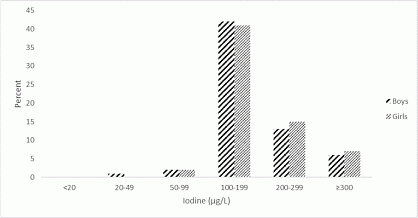ECE2022 Oral Communications Oral Communications 9: Environmental Endocrinology (6 abstracts)
Iodine nutrition among adolescent Faroese comply with recommendations – are we home-safe?
Herborg Líggjasardóttir Johannesen 1 , Stig Andersen 2 , Kári Rubek Nielsen 3 , Pál Weihe 4 , Maria Skaalum Petersen 4 & Anna Sofía Veyhe 4
1The National Hospital of the Faroe Islands, Department of Endocrinology and Medicine, Torshavn, Faroe Islands; 2Aalborg University, Department of Clinical Medicine,, Aalborg, Denmark; 3The National Hospital of the Faroe Islands, Department of Gasteroenterology and Medicine, Torshavn, Faroe Islands; 4The Faroese Hospital System, Department of Occupational Medicine and Public Health, Torshavn, Faroe Islands
Introduction: Iodine nutrition is critical for human health. In recent years the main focus was on the developing brain during pregnancy. In addition, iodine nutrition is essential for growth and development during adolescence. Iodine nutrition was recently low within the recommended range among adult Faroese living on local, iodine-rich marine food items. Dietary habits among young generations are drifting away from local foods, and this raises a concern that led us to perform the first study of iodine nutrition among Faroese teenagers.
Method: We surveyed 14-year olds aiming for the number of participants recommended for a 90% precision of the estimated iodine nutrition level: Urin from one hundred twenty-nine girls (n=65) and boys (n=64) sampled in iodine-free containers. Iodine was measured using standard laboratory methods using the ceri/arsen method after alkaline ashing and creatinine. We calculated the iodine/creatinine ratio to adjust for dilution. A food frequency questionnaire recorded intake of iodine-rich foods.
Results: The median urinary iodine concentration was 166 μg/l, creatinine adjusted 124 μg/g. Iodine was in recommended range in 102 urine samples (79%), above the recommended range in 22 (17%), and in the range of insufficiency in 4%. No single sample suggested severe iodine deficiency. The urinary iodine concentration was markedly higher in those who reported higher "fish dinners per week" than those who reported limited or no fish intake.
Conclusion: Our nationwide study demonstrated Faroese teenagers to be iodine replete according to the WHO recommendations. However, the Faroese may have adapted to a high iodine intake from the formerly frequent intake of marine foods. Dietary habits change with new generations, and surveying iodine deficiency disorders is needed. In addition, the changing dietary habits emphasise the need for continuous monitoring of iodine nutrition.




